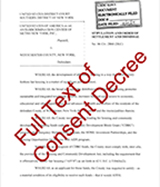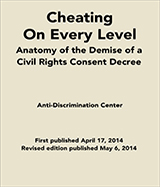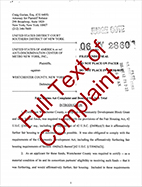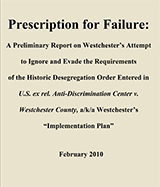Westchester Case
Like more than a thousand other jurisdictions, Westchester County in New York has been a recipient of Community Development Block Grant and other federal housing funds. A condition to be eligible for federal housing grants is the promise to affirmatively further fair housing (AFFH); that is, to identify, analyze, and take the steps necessary to overcome the barriers to fair housing choice. When a jurisdiction seeks payment under its grant, it is making an implied representation that it has affirmatively furthered fair housing.
Over the six-year period from 2000 to 2006, Westchester received more than $50 million in federal funds, making its AFFH representations all along the way. But Westchester was defrauding American taxpayers. In fact, the County had no interest in removing barriers to fair housing choice, especially those erected and maintained by restrictive zoning on the part of its towns and village (more than 20 of whom still have African-American populations of less than 3.0 percent).
ADC undertook to challenge Westchester’s fraud and failure to AFFH by bringing a lawsuit under the federal False Claims Act. The evidence was so strong that, early in 2009, United States District Court Judge Denise Cote found as a matter of law that the County had “utterly failed” to meet its AFFH obligations during the false claims period (2000 to 2006), and that each and all of Westchester’s certifications that it had or would AFFH were “false or fraudulent.”
Faced with certain defeat on the remaining question of whether its false representations were made in reckless disregard or deliberate ignorance of their truth or falsity, Westchester decided to settle the case and enter into a consent decree (that is, a binding federal court order).
The overall financial scope of the settlement — $62.5 million — represents a sum greater than all of the community development and related funding that Westchester received from the federal government during the false claims period.
Most importantly, Westchester was prohibited from ignoring either the residential racial segregation that continues to plague it, or the municipal resistance to affordable housing development that stymies the possibility of changing those patterns. The County was required to initiate legal action against the towns and villages that continued to maintain barriers to fair housing choice, most notably zoning barriers.
Unfortunately, Westchester was given a signal early on by HUD, the court Monitor, and by the office of the U.S. Attorney for the Southern District that there was no appetite for making the kind of structural change contemplated by the consent decree. Westchester immediately began a pattern of resistance that has continued to this day. As documented in Cheating On Every Level, and later in a letter and report to the Court, the Government and the Monitor have allowed Westchester to get away with brazen violations of key requirements of the decree.




